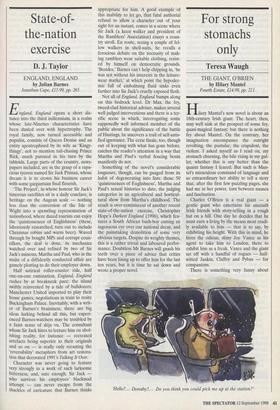State-of-
the-nation exercise
D. J. Taylor
ENGLAND, ENGLAND by Julian Barnes Jonathan Cape, £15.99, pp. 265 England, England opens a short dis- tance into the third millennium, in a realm whose late-Nineties characteristics have been dusted over with hypertrophy. The royal family, now turned accessible and populist, consists of Queen Denise and an entity apostrophised by its wife as `Kingy- thingy', not to mention tail-chasing Prince Rick, much pursued in his turn by the tabloids. Large parts of the country, news- papers included, are in the grasp of a rapa- cious tycoon named Sir Jack Pitman, whose dream it is to crown his business career with some gargantuan final flourish.
'The Project', in whose honour Sir Jack's timorous satellites sit in a daily conclave, is heritage on the Augean scale — nothing less than the conversion of the Isle of Wight into a sprawling representation of nationhood, where dazed tourists can enjoy the 'quintessences of Englishness' (these, laboriously researched, turn out to include Christmas robins and warm beer). Waved through by bought MPs and corrupt coun- cillors, the deal is done, its mechanics watched over and refined by two of Sir Jack's minions, Martha and Paul, who in the midst of a diffidently conducted affair are gamely plotting to do their employer down.
Half satirical roller-coaster ride, half one-on-one rumination, England, England rushes by at breakneck pace: the island swiftly reinvented by a tide of bulldozers, Manchester United imported to play their home games, negotiations in train to resite Buckingham Palace. Inevitably, with a writ- er of Barnes's braininess, there are big ideas lurking behind all this, but experi- enced Barnes-watchers may be troubled by a faint sense of deja vu. The consultant whom Sir Jack hires to lecture him on abol- ishing reality, for instance — recreated artefacts being superior to their originals and so on — is really only recasting the 'reversibility' metaphors from art restora- tion that decorated 1991's Talking It Over.
Character was never going to feature very strongly in a work of such larksome bitterness, and, sure enough, Sir Jack — who survives his employees' blackmail attempt — can never escape from the shackles of caricature that Barnes thinks appropriate for him. A good example of this inability to let go, that fatal authorial refusal to allow a character out of your sight for an instant, comes in a scene where Sir Jack (a keen walker and president of the Ramblers' Association) essays a coun- try stroll. En route, seeing a couple of fel- low walkers in shell-suits, he recalls a ferocious debate on the necessity of mak- ing ramblers wear suitable clothing, resist- ed by himself on democratic grounds. 'Besides,' Barnes can't help chipping in, 'he was not without his interests in the leisure- wear market,' at which point the hypoder- mic full of embalming fluid sinks even further into Sir Jack's cruelly exposed flesh.
Not all of England, England bumps along on this bedrock level. Dr Max, the fey, tweed-clad historical adviser, makes several well judged interventions and there is a ter- rific scene in which, interrogating some supposedly well informed member of the public about the significance of the battle of Hastings, he uncovers a trail of self-satis- fied ignorance. The eerie finale, too, though out of keeping with what has gone before, catches the reader's attention in a way that Martha and Paul's verbal fencing bouts manifestly do not.
Something of the novel's considerable longueurs, though, can be gauged from its habit of degenerating into lists: those 50 'quintessences of Englishness', Martha and Paul's sexual histories to date, the judging categories in an agricultural and horticul- tural show from Martha's childhood. The result is over-reminiscent of another recent state-of-the-nation exercise, Christopher Hope's Darkest England (1996), which fea- tures a South African bush-boy casting an ingenuous eye over our national decay, and the painstaking demolition of some very obvious targets. Despite its weighty themes, this is a rather trivial and laboured perfor- mance. Doubtless Mr Barnes will gnash his teeth over a piece of advice that critics have been lining up to offer him for the last ten years, but it is time he sat down and wrote a proper novel.


































































 Previous page
Previous page